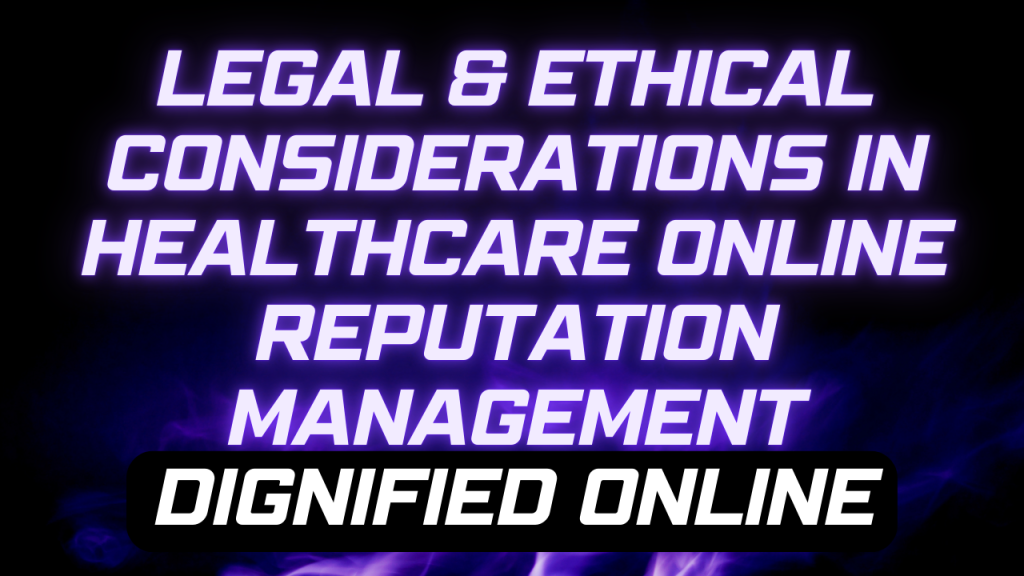In today’s digital-first world, healthcare providers must be more vigilant than ever when managing their online reputations. Patient reviews, testimonials, and social media interactions all shape public perception. However, healthcare organizations face unique challenges that go beyond marketing and public relations — they must navigate a complex landscape of legal and ethical responsibilities. From HIPAA compliance to avoiding defamation, healthcare professionals must tread carefully when responding to online content or promoting patient feedback.
That’s where expert firms like Dignified Online step in. Specializing in healthcare reputation management, Dignified Online helps practices protect their brand integrity while adhering to strict legal standards. Their work ensures that providers can respond to digital challenges with professionalism, compliance, and a commitment to ethical care.
HIPAA Compliance and the Risks of Review Responses
The Health Insurance Portability and Accountability Act (HIPAA) places stringent restrictions on the use and disclosure of patient information. This has major implications for how healthcare providers respond to online reviews.
For instance, even acknowledging that someone is a patient in a response to a review can violate HIPAA. A common misstep is replying to a negative review with an explanation or defense that unintentionally confirms the reviewer’s identity or details of their treatment. While businesses in other industries can address complaints openly, healthcare professionals must maintain strict confidentiality.
Dignified Online helps providers craft compliant responses that maintain professionalism without compromising patient privacy. Their team of legal and digital experts ensures that healthcare practices avoid costly HIPAA violations while still preserving their online reputation.
Testimonials: Powerful Yet Risky
Patient testimonials are among the most effective forms of marketing — they convey trust, satisfaction, and success. However, collecting and publishing them in the healthcare space requires careful handling.
Under HIPAA, even obtaining a testimonial is considered a disclosure of protected health information. Therefore, explicit written consent must be obtained from the patient before their feedback can be published. Additionally, providers must not offer incentives in exchange for testimonials, as this can be viewed as unethical or even deceptive marketing.
Dignified Online works with healthcare providers to develop legally sound testimonial strategies. This includes consent documentation, clear disclaimers, and guidance on presenting reviews in a way that complies with both HIPAA and Federal Trade Commission (FTC) advertising standards.
Defamation and the Ethics of Reputation Defense
Defamation — the act of making false statements that harm someone’s reputation — is a real concern in online healthcare reviews. While providers have the right to protect their reputations, the line between defending a business and retaliating against a reviewer is thin.
Responding aggressively to a review, threatening legal action, or attempting to remove reviews without cause can damage a provider’s credibility and raise ethical red flags. Worse, it can trigger legal backlash or public controversy.
Rather than escalate conflict, Dignified Online emphasizes a dignity-first approach. They help clients evaluate the nature of negative content, determine if it meets the criteria for defamation, and guide them through appropriate legal channels when necessary. Their strategies prioritize long-term trust over short-term retaliation.
Ethical Digital Communication: Beyond Compliance
Legal compliance is just one side of the coin. Ethics in healthcare communication require providers to act with integrity, empathy, and respect in all online interactions.
This means not only safeguarding patient privacy but also ensuring transparency in marketing claims, avoiding exaggerated outcomes, and maintaining a tone that aligns with the values of healthcare. Providers must be especially cautious with social media, where real-time engagement can easily lead to offhand comments that carry significant consequences.
Dignified Online provides training and oversight to healthcare teams on ethical digital conduct. From front-desk staff to social media managers, every point of digital interaction should reflect the organization’s mission to provide compassionate, trustworthy care.
Reputation Management is Risk Management
Online reputation in healthcare is not just about visibility — it’s about liability. A poorly worded response, an unauthorized review post, or a social media slip can result in regulatory penalties, lawsuits, or lost patient trust.
By partnering with a specialized firm like Dignified Online, healthcare providers can take proactive steps to secure their online presence without exposing themselves to legal or ethical pitfalls. Their comprehensive services — including review monitoring, response drafting, patient engagement guidance, and legal consultation — offer peace of mind in a high-stakes environment.
Final Thoughts
Healthcare providers operate in one of the most sensitive and highly regulated industries. Managing an online reputation is not just about branding — it’s about upholding the same standard of care in the digital space as in the exam room.
With the right support, providers can navigate this complex terrain responsibly. Dignified Online stands at the intersection of healthcare, technology, and law — helping practices maintain reputations that reflect the dignity and trust at the core of patient care.

